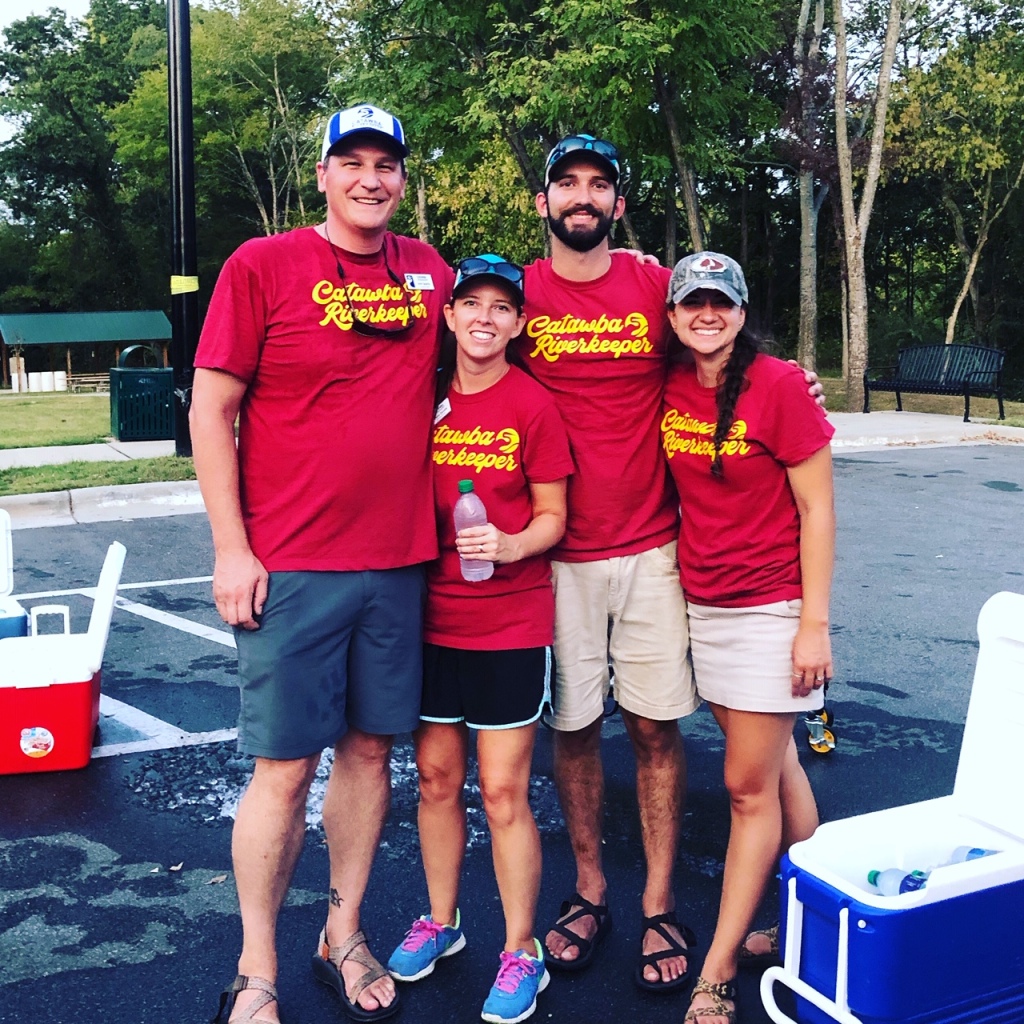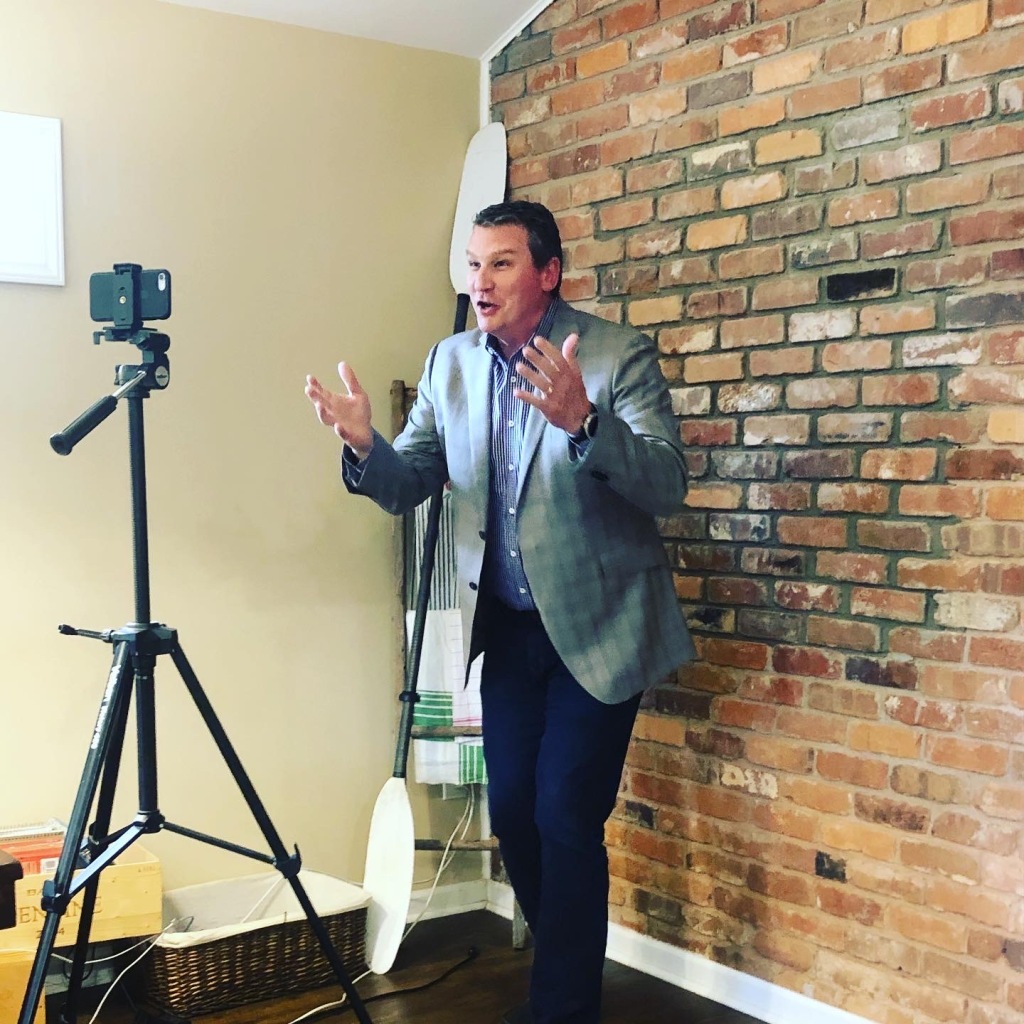
When I took the job as Executive Director of Catawba Riverkeeper Foundation a year ago, I thought I had a pretty decent layman’s understanding of how and why non-profit organizations work. I had served on non-profit boards, had them as clients, and participated in their events. I had good relationships with several non-profit leaders who had shared their experiences with me as I was considering the job move. Boy was I in for an education.
The last year has been one of the most challenging AND rewarding of my professional life. I work with a great team (above at our annual RiverFest event), for a great organization with a rich history, and we do important work. As is often the case when there is a leadership change in an organization, we had some growing pains and adjustment to cultural shifts and operational changes I wanted to make. We had some crisis (our offices flooded less than 2 months after I started and we had to relocate our entire operation for 12 weeks), and some victories. All in all, it was a fantastic year and I learned a lot.
The two most important things I learned were this:
1) Non-profits are no different than any other business, they just have different revenue and profit models. If you are a small non-profit leader with 5-6 employees, you struggle with many of the same things for profit businesses struggle with – paying your people enough, not working yourself to death, managing your cash flow, and figuring out creative ways to accomplish your goals without money. And you have the same opportunities as small for profits – you are nimble enough to make big changes to your business easily, you can attract great people with a fun and flexible culture, and a little financial boost goes a long, long way.
2) Non-profits truly are essential to our way of life and quality of life in America. I didn’t really understand the WHY behind this. I had seen the impact of the work that non-profits do translated into better trails, a deeper appreciation of nature, a more secure food source, an educational boost to a struggling youngster, a safe environment for a child or mother at risk, resources to help veteran’s adjust to civilian life, job opportunities for the underprivileged, and the way that art translates life and feeling for us all. What I didn’t truly understand was WHY DO WE EVEN NEED NON-PROFITS?
What I learned is that the answer is simple – because not everything people, places, animals, and ecosystems NEED for survival is profitable when created, provided, or protected. In some countries, the government steps in and meets those needs at the expense of the state (and the taxpayer). In the United States we place a high value on both individual liberty and local autonomy so only the broadest civic needs are met by the government and the rest is left up to a legal framework that allows for individuals and organizations to stand up for and provide the rest of those needs.
Let me provide an example from the work we do at Catawba Riverkeeper. Very few people would argue that clean and plentiful water is a RIGHT we expect in this country. Protecting our public waters is NOT profitable. On the contrary, it is VERY expensive. It requires constant monitoring and testing of the water to make sure that no one is dumping anything into it that could be hazardous or that environmental changes aren’t killing plant and animal life. It requires educating and working with hundreds of individual municipalities, private individuals, and businesses to ensure that they are using best practices in their use of the water and of their property adjacent to the water. It requires balancing the needs of utilities who use the water to create electricity with that of private citizens who recreate on, live on, and drink the water. And rivers, lakes, and streams don’t care about city, county, or state lines so it requires working with very diverse communities and viewpoints to accomplish all of this. Seems like a job for a huge organization like a federal or state government, right? Not in America, and that is why OUR NON-PROFIT IS NEEDED.
When it comes to water quality, the broadest civic needs are met – guidelines for what constituents “clean water” are in place and permits are granted for use of the water by both public and private users. The largest permittees (such as municipal water utilities like Charlotte Water) are monitored regularly for adherence to their permits. A legal framework is in place via the Clean Water Act for citizens and organizations to raise concerns about private and public entities that are not adhering to the broad guidelines. But here’s the catch…the EPA has relegated authority for oversight and enforcement of the Clean Water Act to states (because it is a huge, complicated, expensive job). The result is that every state monitors and enforces at a different level based on the value they place (and the funds they allocate) to the protection of the waters of their state. In North Carolina, according to a December 2019 report from the Environmental Integrity Project, that budget has been cut by 34% over the past 10 years resulting in 376 fewer staff positions in the NC Dept. of Environmental Quality (DEQ). During that same time, North Carolina was the 10th fastest growing state in the country, adding over 1 million residents from 2008-2018. In the Catawba River Basin (the area our organization is responsible for protecting) there are 2 DEQ enforcement staff members for a 5,000 sq. mile area with over 350 permits to use the waters of the river. OUR NON-PROFIT IS NEEDED.
If water quality and environmental protection is your thing, our organization would love your support. Our staff of now 7 is focused on filling that void in protecting YOUR right to clean and plentiful water left by the system. We regularly test the water and quickly report the results to the public through programs like Swim Guide. We hold polluters accountable when they threaten your drinking water. And we advocate on your behalf to protect your rights to clean water.
If environmental protection isn’t your thing, I would still encourage you to donate today to a non-profit doing work that you care about. They are doing that work because it is needed to fill in the gap between a basic human right and the resources to provide it.
